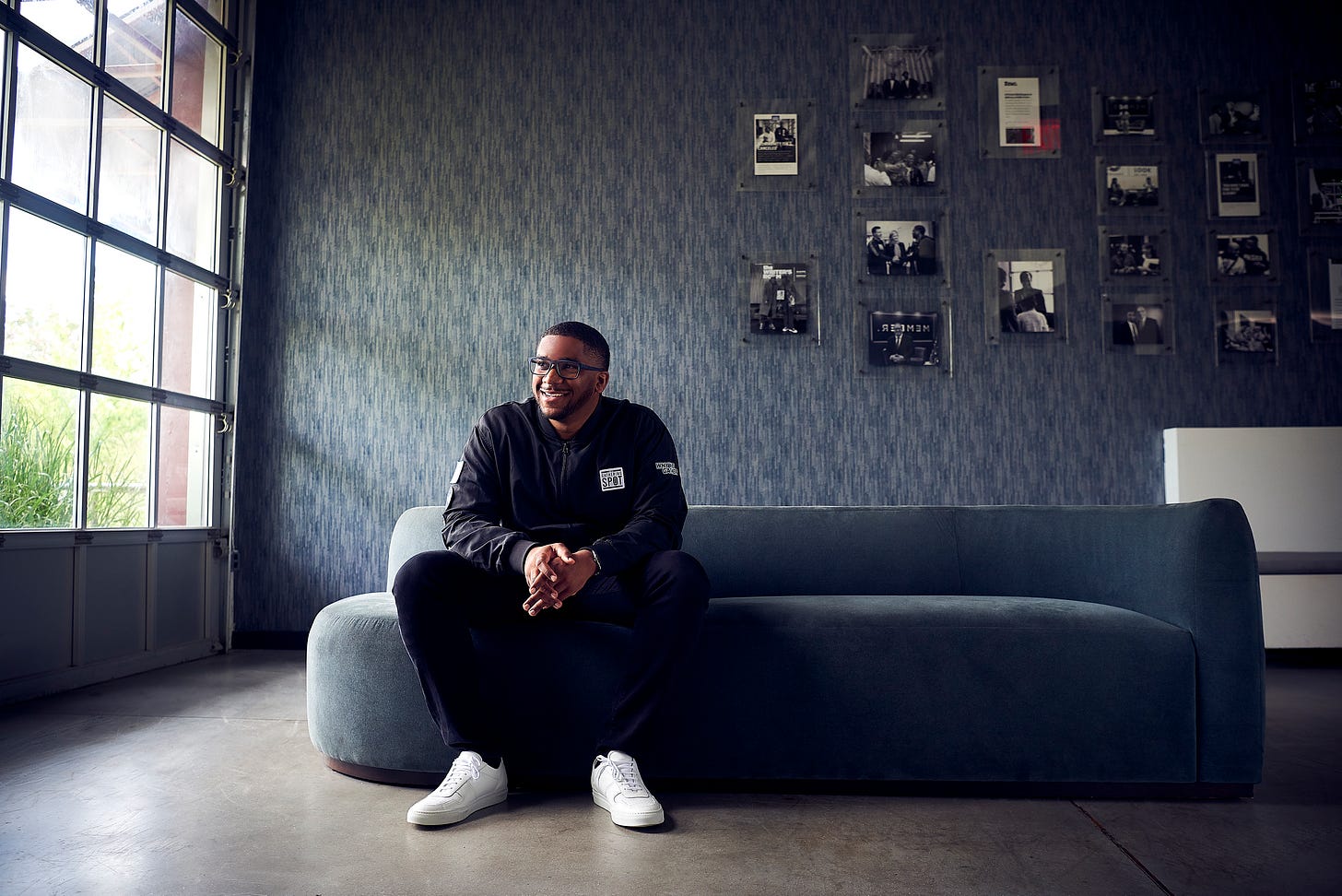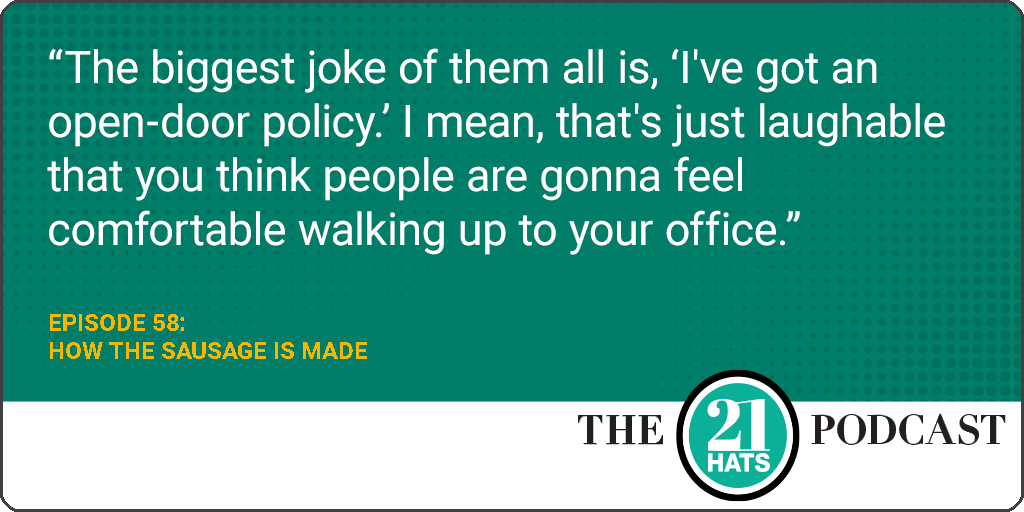Ninety-Seven Straight Noes
Today’s Highlights: Five metrics that can help you plan for the recovery. How smaller businesses are coping with supply chain disruptions. And why Amazon is opening a hair salon.
OPPORTUNITIES
In an interview with 21 Hats, Ryan Wilson explains the idea behind the Gathering Spot, a community center/co-working space, and why he kept going even after 97 investors rejected it and even after Covid: “My litmus test is: if you’re at the bar and look left and look right, you should want to say hello to those people, and it should be diverse. There are people here who have super made it and some who are just getting started. Sometimes I introduce people—and I have a full-time team that curates events—but mostly we just give them a context and space, and then let them come up with whatever they come up with.”
“I knew we were seeing something that the market didn’t see, and that was part of the reason why we needed to keep going. So every no became a sign that ‘Oh, wow, folks really don’t see this coming.’”
“If we’re strangers, and I walk up to you on the street and just say, ‘Hey,’ it’s like, wait, why am I speaking to you? That’s not normal behavior anymore. But you say, ‘I saw you at the Gathering Spot.’ Oh, okay. Now you share something.”
“There’s just no better place [than Atlanta] to be black, 24, having an idea and needing capital.” READ MORE
In recent years, as deliveries of online orders rose, Brooklyn-based Citibin saw an opportunity to fight package pirates: “Liz Picarazzi, the founder of CitiBin, said she developed the product after receiving a flood of inquiries from anxious homeowners. ‘We had people, primarily in Brooklyn, who had seen the trash enclosures, calling us and asking, ‘Hey, can we use that for package delivery?’ she said. ‘Luckily, it was very easy. We just had to change a couple of components.’ The company introduced its ParcelBin in 2018, an enclosure built from powder-coated aluminum and composite siding with space for a combination padlock or an integrated electronic lock. In the second half of 2020, as more people did more shopping online during the pandemic, Ms. Picarazzi said, CitiBin’s sales of parcel units jumped 70 percent, compared to 2019.” READ MORE
REOPENING
Gene Marks says his smartest clients don’t wait for government data: “Instead, they’re gauging the economic recovery by using weekly, high-frequency economic data that lets them know how strong and fast our economy is recovering from the deep pandemic recession. Knowing this helps them better time their hiring and spending decisions as well as the pace and amount of any planned investments. So what are these ‘high frequency’ indicators?”
“Each week since the beginning of the pandemic, [Open Table] has been publishing reservation data by country, state and city, and this data has proved to be a powerful way for business owners to track the recovery of consumer spending. Nationally, restaurant reservations are below their pre-pandemic levels by about 22 percent. But already Florida and Texas have exceeded these levels. You can track this index here.”
“Every day, the TSA publishes the number of travelers going through its checkpoints in U.S. airports. So far, travelers through the nation’s airports are about two-thirds the level compared to this time in 2019. There’s still some ways to go, but it’s a world of difference from where we were last year. The daily numbers are made available here.”
“The American Staffing Association publishes a weekly index that measures the hiring of temporary workers based on thousands of emails sent to companies in four annual sales categories: under $7.5 million, $7.5–$24.9 million, $25–$99.9 million, and $100 million or more. The good news is that temporary staffing needs, after falling precipitously last year, have now reached 2019 levels, which is an indicator of a strong recovery and a significant need for labor. You can track this index here.” READ MORE
RETAIL
Yes, Amazon is opening a hair salon: “The e-commerce giant is opening a new tech-heavy hair salon in partnership with a prominent U.K. stylist. The salon will include tablets at every chair, a screen to virtually ‘try on’ hair colors and a station to display information about products when a customer physically points at them, Amazon said in a news release. The salon is open only to employees to start — a traditional Amazon strategy.”
“At the new salon, customers will be able to check out hair colors via augmented reality before they commit to a dye, and then settle into a chair with a Fire tablet. The salon will include walls of products with QR codes that display more information and, presumably, purchase options.”
“The company recently launched the Amazon Professional Beauty Store in Britain, an online shop that sells wholesale beauty supplies to businesses. The new salon could offer Amazon a way to display some of those products in a real-world setting.” READ MORE
GOVERNMENT SUPPORT
The SBA will now give PPP money to businesses working their way out of bankruptcy: “The federal government has quietly reversed course on a policy that had kept thousands of businesses from applying for pandemic economic aid, with only weeks to go before funds are expected to run out. In late March, ProPublica reported on a Small Business Administration rule that disqualified individuals or businesses currently in bankruptcy from getting relief through the Paycheck Protection Program ... The agency had battled in court against several bankrupt companies attempting to apply for PPP loans, and did not change course even after Congress explicitly passed legislation in December allowing it to do so.”
“On April 6, the SBA released new guidance as part of its frequently asked questions for the program, redefining what it means to be ‘presently involved in any bankruptcy.’”
“Under the new interpretation, debtors who filed under Chapter 11, 12 and 13 — which cover businesses, family farms and individual consumers, respectively — are eligible for PPP loans once a judge has approved their reorganization plan.”
“A spokesperson for the SBA said the explanation had been added for ‘clarity.’” READ MORE
STARTUPS
IndiFit helps fitness instructors host classes independently of gyms: “IndiFit, founded by Cheryl Kemp, is a platform for the independent fitness instructor to schedule digital and in-person classes, and collect payments for them. Born during the Covid-19 pandemic as many gyms were temporarily or permanently closing down and laying off instructors, IndiFit is designed to allow instructors to still teach classes and make a living independently. The solo model also allows instructors to earn larger incomes since they don’t have split class profits with a gym or studio, Kemp said.” READ MORE
LOGISTICS
These are happy days for companies that handle cold storage: “Americans have treated their freezers a bit like security blankets over the past year, stuffing them full of staples and indulgences, a consumer behavior pattern that has had ripple effects beyond the walls of their kitchens. Developers that focus on cold storage facilities say they are seeing growing interest from companies seeking to build, buy or invest in the sector, despite construction costs that are roughly triple that of an ordinary warehouse. Americold, a logistics company focused on the cold storage supply chain, reported that its revenue grew 11.4 percent in 2020 from the previous year.”
“‘Consumption of frozen or prepared meals was already on the rise leading into Covid,’ said Beth Bloom, associate director of food and drink reports at the market research firm Mintel. The pandemic supercharged that trend ...”
“‘This whole idea of food handling and cold storage in an e-commerce world is really different than it was in the past,’ Ms. Standish said. ‘Instead of central locations of huge warehouses that have a long way to go to deliver, we’re seeing a lot of micro-fulfillment centers.’”
“Building cold storage space can cost $150 per square foot, about three times as much as that of conventional warehouse space ...” READ MORE
Here’s how supply chain disruptions are affecting smaller businesses: “An Oklahoma restaurant is paying nearly $200 for a case of gloves that normally costs $40. A medical-device maker in Colorado is tweaking the way it manufactures its products to offset higher plastic costs. A clothing wholesaler in Michigan has hundreds of hoodies it has yet to sell because winter was over by the time they arrived from Bangladesh. The supply-chain disruptions rippling across the business world are taking a heavy toll on small U.S. companies, which have fewer resources to absorb or push back on price increases and less leverage to pass along the higher costs to customers.”
“‘If a steel supplier has even a little supply, they are raising prices knowing it will be difficult for them to replenish their stock,’ said Matt Erfman, chief executive of Dakotaland Manufacturing, a Sioux Falls, S.D., contract metal manufacturer with about 150 employees. ‘It’s almost a straight-upward trajectory.’”
“It recently took five days for a pallet of adhesive tape to travel from Sealstrip’s Gilbertsville factory to a customer’s facility, about a two-hour drive away. ‘Things are sitting in freight depots because they are short on staff,’ Ms. Chandler said.”
“After the 2020 hurricane season, assembly company Automation Systems ordered an extra 20,000 pounds of plastic pellets, normally enough to last the Melrose Park, Ill., company nine months. One month later, prices surged due to the Texas freeze.” READ MORE
THE 21 HATS PODCAST
Episode 58: How the Sausage Is Made: In this week’s conversation with Karen Clark Cole, Jay Goltz, and Stephanie Stuckey, we once again unearth more questions than answers—mostly because there are rarely one-size-fits-all answers to the questions we discuss. This week, those questions include: Can you be friends with your employees? Can you work with your family? How are you coping with price increases in your supply chain? How do you handle shipping—especially given the example set by Amazon? Are refrigerated trucks really called “reefer” trucks? And what happens when employees question whether you should be doing business with a particular person or company? Plus: Jay turns 65 without a succession plan.
You can subscribe to The 21 Hats Podcast wherever you get podcasts.
If you see a story that business owners should know about, hit reply and send me the link.




